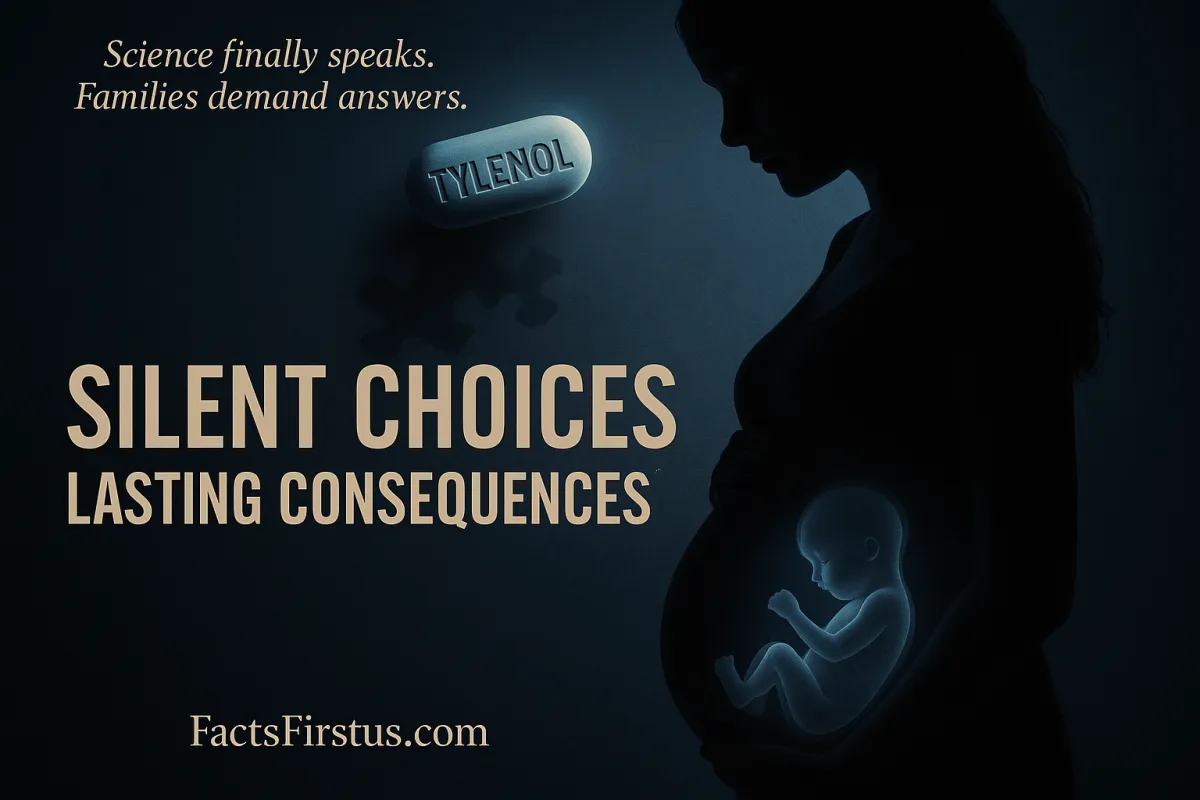
THE PILL THAT CHANGED GENERATIONS
A Nation Confronts the Tylenol Question: Autism, Acetaminophen, and the Fight for America’s Children
The White House links common painkiller to autism risk while opening first FDA-approved treatment — a turning point for families long left waiting
By Staff Writer — September 23, 2025
When Sarah Thompson first held her son, Jacob, she never imagined the everyday pain reliever she took during pregnancy might cast a shadow over his future. Jacob was diagnosed with autism at age four. For years, Sarah wrestled with the silence of unanswered questions.
“I thought I was doing the right thing,” she said softly, twisting a tissue in her hands. “My doctor told me Tylenol was safe. It was the one medicine I could trust. Now I wonder every day if those pills changed the course of my son’s life.”
Her story, once whispered in support groups and private Facebook forums, now echoes from the White House podium.
A Historic Announcement
Yesterday, President Donald J. Trump and senior health officials announced sweeping new measures: a government warning that acetaminophen use during pregnancy may be linked to autism, and the approval of the first FDA-recognized treatment to address symptoms in some children.
“There is mounting evidence finding a connection between acetaminophen use during pregnancy and autism — and that’s why the Administration is courageously issuing this new health guidance.” — White House Press Secretary Karoline Leavitt
For families who have waited decades for science to speak plainly, it was a moment of validation. For critics, it was a spark of controversy. And for millions of parents, it was the most personal of alarms.
The Science: From Trusted Pill to Troubling Signal
Acetaminophen has long been the trusted drug of American households, with nearly half of pregnant women reporting its use. But large-scale studies are raising red flags:
Harvard University: Prenatal acetaminophen exposure linked to higher risks of autism and ADHD.
Johns Hopkins University: Taking Tylenol during pregnancy associated with elevated neurodevelopmental risks.
Mount Sinai: Evidence strengthens the case for caution.
Dr. Andrea Baccarelli of Harvard’s T.H. Chan School of Public Health explained: “We found evidence of an association between exposure to acetaminophen during pregnancy and increased incidence of neurodevelopmental disorders in children.”
A 2021 international consensus called on women to minimize exposure, urging the lowest possible dose for the shortest time. The concern centers on acetaminophen’s effects on fetal brain development, a risk long dismissed as unlikely.
The First Treatment Option: A Ray of Hope
The announcement went beyond warnings. The FDA will now recognize leucovorin—a decades-old generic drug—as a treatment for children with autism symptoms linked to cerebral folate deficiency.
For many families, this is more than a medical update. It is hope made tangible.
Studies show up to 60 percent of affected children may see improvements in communication with leucovorin. While it is not a cure, it is the first official acknowledgment that autism symptoms can be eased with targeted therapy.
“Parents are understandably impatient when they learn that clinical trials will take years to complete. Americans are tired of waiting, so we are cutting regulatory red tape to enable families to pursue treatment now.” — Administration Statement
Medicaid and CHIP will cover the treatment nationwide, ensuring access for families across economic lines.
The Human Cost Behind the Numbers
The CDC estimates autism now affects 1 in 36 children. Behind that number are parents like Sarah, facing sleepless nights and endless therapy sessions.
Mark and Elena Rivera of Texas described raising their daughter, Ana, who rarely speaks. “We’ve tried everything,” Mark said. “Every therapy, every supplement. We’ve prayed for something real. If this treatment can give her a voice, even a few words… that would change our world.”
“For the first time, I feel like someone is listening to us, not just studying us.” — Parent Advocate
Politics and Pushback
No policy under President Trump lands without a storm. Supporters praised the announcement as bold and overdue, while mainstream outlets criticized it as premature, warning that correlation is not causation.
Administration officials pushed back sharply.
“We will not be deterred in these efforts as we know millions across America are grateful.” — President Trump
The clash highlights a deeper tension: science’s demand for caution versus families’ demand for action. For many parents, “wait and see” has meant losing precious years of their child’s development.
The Road Ahead
The NIH is launching a $50 million Autism Data Science Initiative, combining genetics, environment, and prenatal factors in a new field known as exposomics. Researchers are pursuing bold hypotheses—from mitochondrial dysfunction to microbiome disruptions—in the hunt for answers.
But two immediate signals—acetaminophen risks and folate deficiency—are driving policy now. Families, once told to be patient, are finally being told to act.
A New Era of Honesty
For decades, autism parents have lived in a fog of uncertainty. Yesterday, the government broke through that fog—not with all the answers, but with honesty, urgency, and a lifeline of treatment.
Sarah Thompson, reflecting on the news, said what millions are feeling: “I can’t change the past. But maybe now, I can change Jacob’s future.”
Sources
White House Briefing, September 22, 2025
Nurses’ Health Study II
Boston Birth Cohort
Harvard T.H. Chan School of Public Health
Johns Hopkins University
Mount Sinai Health System
International Consensus Statement on Acetaminophen and Pregnancy (2021)

